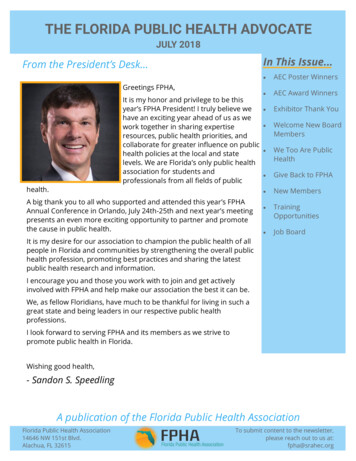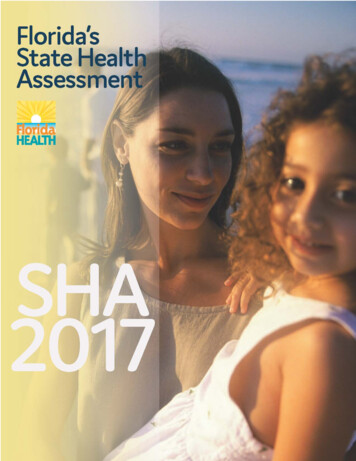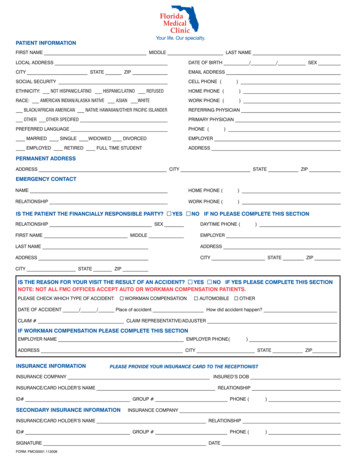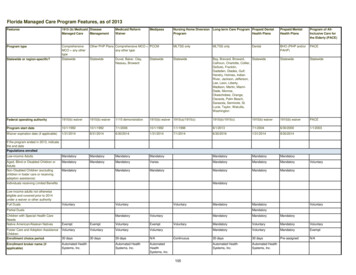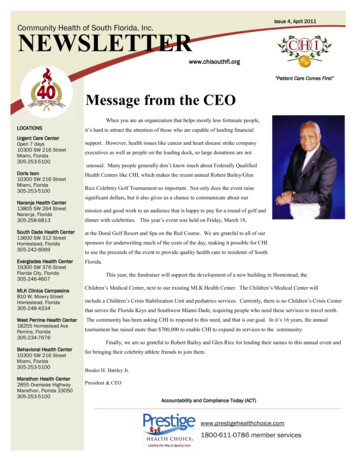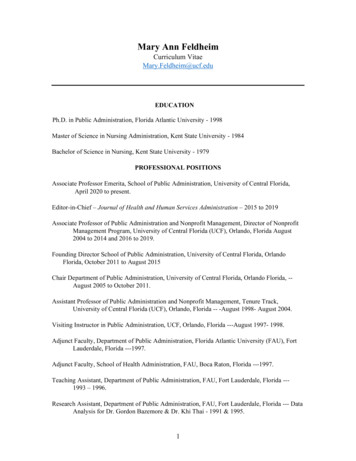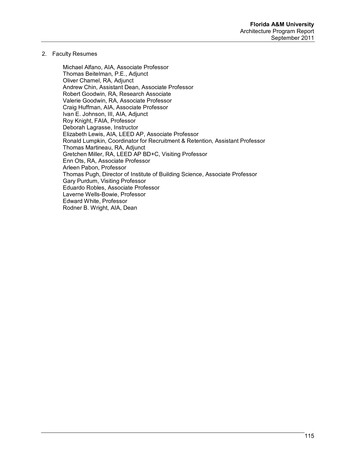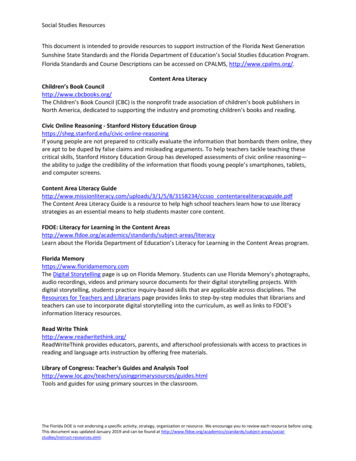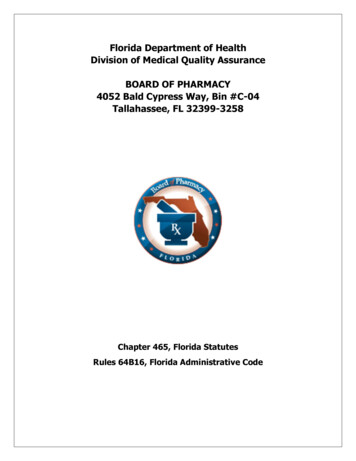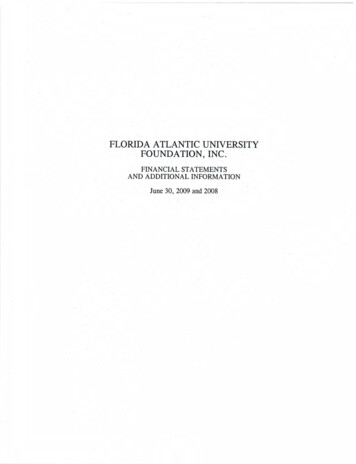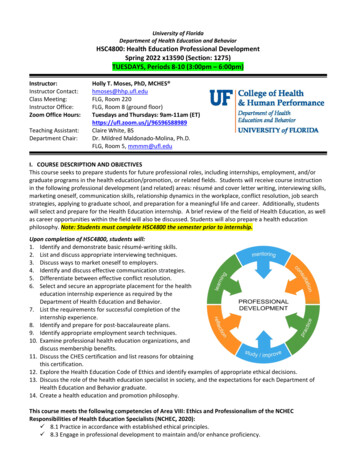
Transcription
University of FloridaDepartment of Health Education and BehaviorHSC4800: Health Education Professional DevelopmentSpring 2022 x13590 (Section: 1275)TUESDAYS, Periods 8‐10 (3:00pm – 6:00pm)Instructor:Instructor Contact:Class Meeting:Instructor Office:Zoom Office Hours:Teaching Assistant:Department Chair:Holly T. Moses, PhD, MCHES hmoses@hhp.ufl.eduFLG, Room 220FLG, Room 8 (ground floor)Tuesdays and Thursdays: 9am‐11am (ET)https://ufl.zoom.us/j/96596588989Claire White, BSDr. Mildred Maldonado‐Molina, Ph.D.FLG, Room 5, mmmm@ufl.eduI. COURSE DESCRIPTION AND OBJECTIVESThis course seeks to prepare students for future professional roles, including internships, employment, and/orgraduate programs in the health education/promotion, or related fields. Students will receive course instructionin the following professional development (and related) areas: résumé and cover letter writing, interviewing skills,marketing oneself, communication skills, relationship dynamics in the workplace, conflict resolution, job searchstrategies, applying to graduate school, and preparation for a meaningful life and career. Additionally, studentswill select and prepare for the Health Education internship. A brief review of the field of Health Education, as wellas career opportunities within the field will also be discussed. Students will also prepare a health educationphilosophy. Note: Students must complete HSC4800 the semester prior to internship.Upon completion of HSC4800, students will:1. Identify and demonstrate basic résumé‐writing skills.2. List and discuss appropriate interviewing techniques.3. Discuss ways to market oneself to employers.4. Identify and discuss effective communication strategies.5. Differentiate between effective conflict resolution.6. Select and secure an appropriate placement for the healtheducation internship experience as required by theDepartment of Health Education and Behavior.7. List the requirements for successful completion of theinternship experience.8. Identify and prepare for post‐baccalaureate plans.9. Identify appropriate employment search techniques.10. Examine professional health education organizations, anddiscuss membership benefits.11. Discuss the CHES certification and list reasons for obtainingthis certification.12. Explore the Health Education Code of Ethics and identify examples of appropriate ethical decisions.13. Discuss the role of the health education specialist in society, and the expectations for each Department ofHealth Education and Behavior graduate.14. Create a health education and promotion philosophy.This course meets the following competencies of Area VIII: Ethics and Professionalism of the NCHECResponsibilities of Health Education Specialists (NCHEC, 2020): 8.1 Practice in accordance with established ethical principles. 8.3 Engage in professional development to maintain and/or enhance proficiency.
Course Textbooks1. Rath, T. (2007). StrengthsFinder 2.0. Gallup Press. (Required)2. Jay, M. (2012). The defining decade: Why your twenties matter and how to make the most of them now. NewYork: Twelve. (Required)3. NCHEC, Inc. and SOPHE, Inc. A competency‐based framework for health education specialists – 2020.Whitehall, PA. petencies.4. Code of Ethics for the Health Education Profession . (2020). Coalition for National Health EducationOrganizations (CNHEO). [Document]. mlCourse ReadingsIn addition to the course texts, supplemental readings will be assigned throughout the semester. The readingswill be provided to students prior to the class session in which they should be read. The readings will pertain tothe Health Education/Promotion field, and/or professionalism in the workplace. The instructor reserves the rightto assign zero points for a completed attendance assignment if the student did not complete the assignedreadings, failed to attend the associated module lecture(s), or did not participate meaningfully during class.Course PlatformAll materials for HSC4800 will be housed in Canvas, the University of Florida’s course management system.Students must be proficient in working with Canvas. For Canvas‐related technical difficulties, contact the UF HelpDesk at Learning‐support@ufl.edu; 352‐392‐HELP (option 2); or, helpdesk.ufl.edu/.Class FormatAs of this date (January 2, 2022), the state of Florida, Board of Trustees, and UF administration have deemed itsafe to hold face‐to‐face classes in a physical classroom. This means you are expected to be physically present inthe classroom on Tuesdays from 3pm‐6pm (ET). No recordings of the in‐class sessions will be made and nooption to attend via Zoom will be available.Communication with Instructor Instructor is available weekly, during regular office hours (Tuesdays and Thursdays from 9‐11am). If a student is unable to attend weekly office hours, the instructor is available for phone call/zoom meetingupon request. To request a meeting outside of office hours, please send an email to hmoses@hhp.ufl.edu,and include your complete availability for the week ahead (five business days). The best way to reach the instructor is through email (hmoses@hhp.ufl.edu). Note: See next section titled“Message Etiquette” for additional information on email correspondence expectations. Students are expected to check their GatorMail email, as well as Canvas announcements often and regularly.Message EtiquetteProfessionalism is expected of all students. Thus, you should use proper etiquette when sending emails. Thisincludes an appropriate “Subject” heading stating your course number and topic of message, a propergreeting/salutation, grammatically correct message body, and a proper closing.Inappropriate emails or messages that lack proper etiquette will be returned.Sample message:Subject Heading: HSC4800 TUESDAY – Internship HelpGreeting: Hello Dr. Moses,Message Body:I would like to schedule a meeting with you to discuss the internship search. I am, unfortunately, not available during yourposted office hours. My availability for the next five business days is as follows: Monday/Wednesday/Friday: 8am‐2pm;Tuesday/Thursday: 1pm‐5pm. I look forward to speaking with you.Closing: Thank you!Name: Your name / HSC 4800 TUESDAY, Spring 20222
II. COURSE ASSIGNMENTS1. Attendance and ParticipationAttendance, in the form of individual and group participation in weekly course modules is required and willcount for a significant portion of a student’s course grade. Attendance is recorded throughout the semesterusing diverse methods. Attendance includes engagement during class. It is important for students tocomplete required readings before class, attend the entire class session, and actively participate in class. Allattendance assignments must be submitted in the format requested and by the posted due date.The instructor reserves the right to assign zero points for a completed attendance assignment if the studentdoes not watch the associated module lectures, nor complete the assigned readings.2. Application for InternshipThe internship application is a formal agreement between the intern, the University internship coordinator,and the internship site supervisor. This form provides the internship coordinator with an assessment of theappropriateness of the student’s selected internship, and a plan of activities/programs offered by the agency.Each student must tour the internship site and meet their supervisor prior to submitting the application.Profile forms containing information on approved health education/promotion internships are located onlineat heb/heb‐internship‐sites/. If you require assistance withselecting an appropriate internship site, meet with Dr. Moses during the beginning of the semester. At thattime, recommendations will be made and any concerns you may have discussed. Note: If you are interestedin a new internship site (one that is not listed on the Department website) you must contact Dr. Mosesbefore interviewing with the site (see page 8 of syllabus).3. Basic Life Support (BLS) for Healthcare Providers (BLS) or Adult/Child CPR/AED & First Aid CertificationAll students must complete a Basic Life Support for Healthcare Providers (BLS), or an Adult/Child CPR/AED &First Aid Certification course. Certification can be obtained from the American Red Cross, American HeartAssociation, or American Safety and Health Institute (ASHI). Exclusively online certifications will NOT beaccepted; however, hybrid certifications are permitted. Certification(s) that expire during the internshipsemester will not be accepted. Note: BLS for Healthcare Providers certification required for clinical sites.4. Professional Skills TestThis assignment requires students to prepare for a series of ‘tests’ concerning several key professional skills.The Professional Skills Test will take place during an assigned date and time (agreed upon by the instructorand student) and will include evaluations of the following professional skills: (1) résumé portfolio, (2)professional phone call to a prospective supervisor, (3) zoom interview with a prospective supervisor, and (4)delivery of a personal sales pitch. More information can be found in Module 6, and scheduling will beginduring the third week of the semester and will require input from the student.5. StrengthsFinder 2.0. Paper and DiscussionAll students are required to read Tom Rath’s StrengthsFinder 2.0. (2007), as well as take the online strengthsassessment to complete the StrengthsFinder 2.0. Paper and Discussion assignments. Students should plan asnecessary to ensure the assessment and reading are completed prior to the assignment due dates. Moreinformation is provided within the assignment submission folders in Canvas.6. Defining Your Decade Paper and DiscussionAll students are required to read Meg Jay’s The defining decade: Why your twenties matter and how to makethe most of them now (2012) to complete the Defining Your Decade Paper and Discussion assignments.Students should plan as necessary to ensure the reading is completed prior to the assignment due dates.More information is provided within the assignment submission folders in Canvas.3
7. Philosophy of Health Education and PromotionAll students are required to prepare a professional philosophy of Health Education and Promotion. Studentswill discuss their beliefs related to the field of health education/promotion. Students may also discuss theirpersonal philosophy of life and health, but the primary focus of the paper must be healtheducation/promotion. Students will prepare an APA (7E) formatted paper of about 600‐750 words. Moreinformation is provided within the corresponding module and assignment submission folder in Canvas.III. COURSE EVALUATIONAssignmentsPoint Value1. Attendance & Participation 21 assignments @ 5 points each; lowest score dropped1002. Internship Application253. Adult/Child CPR/AED & First Aid Certification BLS for Healthcare Providers required for clinical sites4. Professional Skills TestPersonal Sales Pitch (20); Resume Portfolio (25);Zoom Interview (20); Professional Phone Call/Email (10)10755. StrengthsFinder 2.0. Paper (40) and Discussion (10)506. Defining Your Decade Paper (40) and Discussion (10)507. Health Education Philosophy (40)40Total points possible:Grading ScaleAA‐B BB‐C CC‐D 9.9%63%‐67.9%60%‐62.9%0%‐59.9%325.5 ‐ 350315 ‐ 325.25308 ‐ 314.75290.5 ‐ 307.75280 ‐ 290.25273 ‐ 279.75255.5 ‐ 272.75245 ‐ 255.25238 ‐ 244.75220.5 ‐ 237.75210 ‐ 220.250 ‐ 209.75350For information on the University of Florida grading policies visit s/grades‐grading‐policies/.IV. DEPARTMENT INTERNSHIP PROCEDURESTwo assignments built into this course align with the HEB Internship Program requirements. In addition to theseassignments, students must also meet ALL the below requirements to be CLEARED to register for HSC4876 andparticipate in the HEB Internship Program. Students may also view these requirements in the HSC4876 Syllabus. UF and Upper Division GPA of 2.0 or higher. HSC coursework GPA of 2.8 or higher. Absence of grades N/NG, H, and/or I on transcript. Successful completion of all required coursework ‐‐‐ general education, Gordon Rule, universal tacking, HEBmajor and specialization coursework, elective coursework, as well as current semester coursework. The ONLYcourse requirement remaining on a student’s UNMET degree audit is HSC4876. Approved internship application. Proof of valid Adult/Child CPR/AED & First Aid Certification. Submission of all internship site‐specific requirements (as required by the site). HSC4876 registration for the semester/year approved for internship by the Department InternshipCoordinator. Full‐time interns must register for 15 credits; part‐time interns must register for 06 credits. SUMMER 2022 Internship Dates: May 9, 2022 – July 31, 2022o HEB interns do NOT observe the summer break week between Sum A and Sum B. FALL 2022 Internship Dates: August 22, 2022 – November 13, 20224
V. COURSE POLICIES1. Special Accommodations:Students requesting accommodations must first register with the Dean of Students Office (DSO). The DSO willprovide documentation to the instructor after a student makes the accommodation request (must becompleted each semester). Please ensure the documentation is sent within the first two weeks of class.2. Academic Honesty:UF students are bound by The Honor Pledge which states, “We, the members of the University of Floridacommunity, pledge to hold ourselves and our peers to the highest standards of honor and integrity by abidingby the Honor Code. On all work submitted for credit by students at the University of Florida, the followingpledge is either required or implied: “On my honor, I have neither given nor received unauthorized aid indoing this assignment.” The Honor Code duct‐honor‐code/) specifies a number of behaviors that are in violation of this code and the possible sanctions.Furthermore, you are obligated to report any condition that facilitates academic misconduct to appropriatepersonnel. If you have any questions or concerns, please consult with the instructor of this class.3. Grade Adjustments:It is unethical and in direct violation of the UF Student Honor Code to request an unjustifiable gradeadjustment (UF Student Honor Code: “Conspiracy to Commit Academic Dishonesty”). Under nocircumstances will I ever ‘round up’ a student’s grade (a 89.99% is a B ), nor will I offer extra credit.Additionally, I will not discuss grades over email to protect student privacy. If a grade input error occurs,students must notify me within one week. I will examine the Canvas grade to determine whether acalculation error has occurred. If an error occurred, the grade will be adjusted. Unless otherwise specified,students have one week to review assignment grades and contact the instructor with questions orconcerns. Students who fail to review their assignment scores within one week of the release of gradesmay not request retroactive adjustments on scores at the end of the term.4. Assignments:Students are expected to complete work of the highest quality and reflective of college‐level effort.Assignments must be submitted in the format requested, following the rules and guidelines as outlined in thePublication Manual of the American Psychological Association (7th Edition), when applicable. Assignmentsmust also include the student’s name and UFID, as well as be submitted by the assigned due date.5. Excused Absence Policy:Per University of Florida policy, excused absences include medical appointments and illness (with doctor’snote), deaths in the family (with documentation) and school events (with documentation on schoolletterhead). If you anticipate missing a submission deadline, please email me BEFORE the deadline passes.Requirements for class attendance are consistent with university policies found in the online catalog ns/info/attendance.aspx.6. Communication with Course Instructor:Regarding communication, send messages from your GatorMail email account to my outlook account(hmoses@hhp.ufl.edu). Email inquiries received Mondays through Thursdays will usually receive a replywithin 24 hours of receipt. Messages sent after 12 p.m. on Fridays and/or during the weekends will most likelyreceive a reply the following Monday. Refer to the Message Etiquette information on page 2 of the syllabus.Additionally, students must regularly check for course‐related notices via the Announcement tool on theCanvas course website. To “regularly check” means as often as possible, or at least three times a week.Students who fail to keep up with posted Announcements risk missing important information related to thecourse, including possible changes in assignment due dates.5
7. Technology:For this course, students must have access to the University of Florida’s minimum technology/computerrequirements. This includes, but is not limited to Wi‐Fi network, working computer system with appropriatesoftware, webcam and microphone. If you find yourself in an area with limited Wi‐Fi access, please know thateduroam, the on‐campus Wi‐Fi network, is available nationally and internationally. UF students can accesseduroam free with their GatorMail login credentials. The eduroam network is fast and secure and has more than10,000 wi‐fi hotspots in 106 countries and territories worldwide. For additional information about eduroam visithttps://getonline.ufl.edu/.8. Online Course Evaluation Process:Students are expected to provide feedback on the quality of instruction in this course based on 10 criteriaidentified by the University. These evaluations are conducted online and are typically open during the last two orthree weeks of the semester. Summary results of these assessments are available at evaluations.ufl.edu/results.9. Preferred Pronoun and Name Change in Canvas:It is important to the learning environment that you feel welcome and safe in this class; and that you arecomfortable participating in class discussions and communicating with me on any issues related to the class. Ifyour preferred name is not the name listed on the official UF roll, please let me know as soon as possible by e‐mailor otherwise. I would like to acknowledge your preferred name, and pronouns that reflect your identity. Pleaselet me know how you would like to be addressed in class, if your name and pronouns are not reflected by your UF‐rostered name. I welcome you to the class and look forward to a rewarding learning adventure together.You may also change your “Display Name” in Canvas. Canvas uses the "Display Name" as set in myUFL. TheDisplay Name is what you want people to see in the UF Directory, such as "Ally" instead of "Allison." To updateyour display name, go to one.ufl.edu, click on the dropdown at the top right, and select "Directory Profile." Click"Edit" on the right of the name panel, uncheck "Use my legal name" under "Display Name," update how you wishyour name to be displayed, and click "Submit" at the bottom. This change may take up to 24 hours to appear inCanvas. This does not change your legal name for official UF records.10. House Bill 233 Intellectual and Viewpoint Diversity Act:Per the House Bill 233 Intellectual and Viewpoint Diversity Act, students are allowed to record video or audio ofclass lectures. However, the purposes for which these recordings may be used are strictly controlled. The onlyallowable purposes are (1) for personal educational use, (2) in connection with a complaint to the university, or(3) as evidence in, or in preparation for, a criminal or civil proceeding. All other purposes are prohibited.Specifically, students may not publish recorded lectures without the written consent of the instructor.A “class lecture” is an educational presentation intended to inform or teach enrolled students about a particularsubject, including any instructor‐led discussions that form part of the presentation, and delivered by anyinstructor hired or appointed by the University, or by a guest instructor, as part of a UF course. A class lecturedoes not include lab sessions, student presentations, clinical presentations (patient history), academic exercisesinvolving solely student participation, assessments (quizzes, tests, exams), field trips, private conversationsbetween students in the class or between a student and the faculty or lecturer during a class session.Publication without permission of the instructor is prohibited. To “publish” means to share, transmit, circulate,distribute, or provide access to a recording, regardless of format or medium, to another person (or persons),including but not limited to another student within the same class section. Additionally, a recording, ortranscript of a recording, is considered published if it is posted on or uploaded to, in whole or in part, any mediaplatform, including but not limited to social media, book, magazine, newspaper, leaflet, or third‐partynote/tutoring services. A student who publishes a recording without written consent may be subject to a civilcause of action instituted by a person injured by the publication and/or discipline under UF Regulation 4.040Student Honor Code and Student Conduct Code.6
VI. UNIVERSITY RESOURCES Online Computing Help Desk: http://helpdesk.ufl.edu/The UF Computing Help Desk is available to assist students when they are having technical issues. Online Library Help Desk: http://guides.uflib.ufl.edu/content.php?pid 86973&sid 686381.The help desk is available to assist students with access to all UF Libraries resources. Disabilities Resource Center: http://www.dso.ufl.edu/drc/If you have a physical, learning, sensory or psychological disability, please visit the DRC. Inclusion, Diversity, Equity & Access (IDEA): hhp.ufl.edu/about/inclusion/; www.cdo.ufl.edu/An inclusive, diverse, equitable, and accessible (IDEA) community is a top priority at the University of Florida.In the College of HHP, we value and work to promote a learning community where all people areacknowledged, valued and respected. Dean of Students Office: http://www.dso.ufl.edu/Visit the Dean of Students site for help resolving a conflict or for student code of conduct inquiries. Counseling and Wellness Center: http://www.counseling.ufl.edu/cwc/Visit the counseling and wellness center to speak to a counselor about any personal problems. Student Health Care Center: https://shcc.ufl.edu/Call 352‐392‐1161 for 24/7 information to help you find the care you need. University Police Department: https://police.ufl.edu/Call 352‐392‐1111 (or 9‐1‐1 for emergencies). UF Health Shands Emergency Room/Trauma Center: 352‐733‐0111For immediate medical care go to the emergency room at 1515 SW Archer Road (32608). U Matter, We Care: umatter@ufl.eduYour well‐being is important to the University of Florida. The U Matter, We Care initiative is committed tocreating a culture of care on our campus by encouraging members of our community to look out for oneanother and to reach out for help if a member of our community is in need. If you or a friend is in distress,please contact umatter@ufl.edu so that the U Matter, We Care Team can reach out to the student indistress. A nighttime and weekend crisis counselor is available by phone at 352‐392‐1575. The U Matter,We Care Team can help connect students to the many other helping resources available including, but notlimited to, Victim Advocates, Housing staff, and the Counseling and Wellness Center. Please remember thatasking for help is a sign of strength. GatorWell Health Promotion Services: http://gatorwell.ufsa.ufl.eduHealth Education for the Gator Nation. GatorWell Health Promotion Services supports student success byproviding excellent, accessible, and relevant health information, programs and services to UF students abouthealth and wellness topics relevant to the college experience.7
Searching for a Health Education Internship: Important ProceduresPlease review the below guidelines for the internship search, and follow the outlined procedureas you begin your search for a meaningful Health Education internship.Step 1: Review the Department list of internship profiles, found at heb/heb‐internship‐sites/.The posted internship profiles include past/present internship supervisors, who identified an interest for hosting aHealth Education intern. The internships are divided into three geographic areas: Gainesville, Within Florida, andOutside of Florida. While pre‐interns are not required to select an internship from the Department’s internshipprofile list, it is highly recommended that each pre‐intern review the internship profiles to generate a list ofpossible locations they would want to seek out an internship in. Students may also use various search engines toidentify possible internship sites in the geographic location(s) in which they plan to live during the final semesterof their undergraduate program (see “Internship Search” lecture for potential search engines for public healtheducation‐related internships).Step 2: Create an Excel spreadsheet to organize all internship sites of interest. Include the internship agencyname, location (city, state), supervisor’s name and contact information (email and phone number), date andmethod of first contact, and follow‐up comments (additional columns may be added per the student’s desire).Update the internship search Excel spreadsheet with each correspondence with an internship supervisor.Step 3: Contact prospective supervisors via email or phone, following guidelines discussed in the “SupervisorCorrespondence” lecture. The primary goals of correspondence with internship site supervisors include:identifying level of interest among supervisors for hosting an intern; appropriateness of site for qualifying as aHealth Education internship; and, securing an interview with the agency/organization. Note: Pre‐interns are highlyencouraged to forward copies of an up‐to‐date, relevant cover letter and résumé to prospective internship sitesupervisors, which will aid the process for securing an interview.Step 4: When corresponding with a new internship site (a site that has not previously supervised HealthEducation interns), forward the agency’s name, location (city, state), supervisor’s name and contact information(email) to your instructor. This step is MANDATORY for ALL NEW INTERNSHIP SITES!!! Upon receipt, yourinstructor will email the prospective internship supervisor with details about the Health Education internship,including the Department’s requirements for internship job duties, and expectations for site supervisors. Afterinitial communication with the instructor, the prospective internship site supervisor will email the pre‐intern toset‐up an �‐‐‐‐IMPORTANT REMINDERHEB intern job duties must align with the Responsibilities and Competencies of Health Education Specialists(NCHEC, 2020). The Eight Areas of Responsibility contain a comprehensive set of Competencies and Sub‐competencies defining the role of the health education specialist. These Responsibilities were verified by the 2020Health Education Specialist Practice Analysis II (HESPA II 2020) project and serve as the basis of the CHES exam.Area I: Assessment of Needs and CapacityArea II: PlanningArea III: ImplementationArea IV: Evaluation and ResearchArea V: AdvocacyArea VI: CommunicationArea VII: Leadership and ManagementArea VIII: Ethics and Professionalism8
HSC4800 Residential: Spring 2022 Course ScheduleTUESDAY: Class ID 13590 (Section: 1275)***ALL STUDENTS are REQUIRED to be PRESENT FOR CLASS EACH TUESDAY from 3‐6PM (ET)***Week: Due DateModulesCourse Assignments (point value)Start Here: Welcome to HSC4800!Module 1: Course Overview & Internship RequirementModule 2: Internship Search Guidelines and ContactingInternship SupervisorsQuiz 1: Course Overview (5)Degree Audit Check (5)Module 1 Discussion (5)Digital Photo for Canvas (5)Health Education Internship Search Preparation (5)Email to Prospective Supervisor (5)Week 3: Jan 25Module 3: Building Effective Résumés and Cover LettersResume (5)Week 4: Feb 1Module 4: Interviewing Techniques and PreparationModule 5: Marketing YourselfInterview Q&A (5)Marketing Yourself Activity (5)Week 5: Feb 8StrengthsFinder 2.0 (Rath, 2007)StrengthsFinder Paper (40); StrengthsFinder Online Discussion (10)Week 6 Feb 15***Zoom***Module 6: Professional Skills Test***students must be available from 3‐6pm on Feb 15***Module 7: Effective Communication and CulturallyInclusive Communication in the WorkplacePersonal Sales Pitch (20); Résumé Portfolio (25);Zoom Interview (20); Professional Phone Call (10)Bird Personality Test (5)Culturally Inclusive Communication (5)Week 8: Mar 1The Defining Decade (Jay, 2012)Defining Your Decade Paper (40); Defining Your Decade Discussion (10)Week 9: Mar 8Spring Break – No ClassesWeek 1: Jan 11Week 2: Jan 18Week 7: Feb 22Week 10: Mar 15Health Education PhilosophyWeek 11: Mar 22Module 8: Conflict ResolutionModule 9: Professionalism and Social MediaWeek 12: Mar 29Module 10: Post Graduation Planning**Schedule Professional Skills Test **Internship Search Progress Report #1 (5)Philosophy of Health Education & Promotion Paper due April 19, 2022***Internship Search Progress Report #2 (5)Conflict Styles Assessment (5)LinkedIn Profile (5)Post‐Baccalaureate Plan (5)Quiz #2: Post Graduation Planning (5)Module 11: Health Education Code of Ethics***On‐Time Due Date for Internship Paperwork***Professional Code of Ethics (5)Week 14: Apr 12Module 12: Internship ProceduresQuiz #3: Internship Pro
6. Defining Your Decade Paper and Discussion All students are required to read Meg Jay’s The defining decade: Why your twenties matter and how to make the most of them now (2012) to complete the Defining
